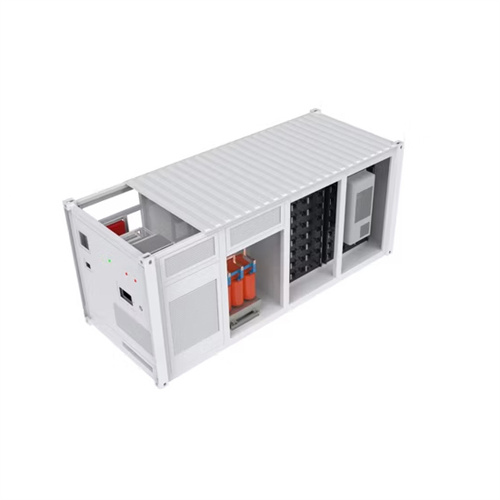Why is the temperature low when the photovoltaic panel is disconnected

What Are the Effects of Temperature on Solar Panel
Factors That Affect Solar Panel Efficiency. A variety of factors can impact solar performance and efficiency, including:. Temperature: High temperatures will directly reduce the efficiency of a photovoltaic panel.;

Understanding PV Module Performance Characteristics
The efficiency of PV modules is determined by how well they convert solar power to electrical power, influenced by factors like sunlight intensity and cell temperature. Image used courtesy of Adobe Stock . The principal

Solar Panels With No Load (Not Connected)
A thermal solar panel can overheat if its inner temperature exceeds 300 degrees and nothing is drawing electricity from it. This can cause the system to break down, so you must disconnect it if you won''t use it for a

HOW TEMPERATURE IMPACTS SOLAR PANEL
The decline in performance becomes more evident in areas with hot and humid climates, where temperatures often exceed 40℃ (104°F).On the other hand, low temperatures can also reduce the output of solar panels.

Solar panel facts – Disconnected Energy
The stated 25°C is not ambient air temperature, that''s the temperature of the actual panel surface and that can easily get up to around 80°C in the summer sun. Generally speaking, every 1°C

What Are the Effects of Temperature on Solar Panel
For every degree Celsius above 25°C (77°F), a solar panel''s efficiency typically declines by 0.3% to 0.5%. This decrease in efficiency can be significant in regions where temperatures rise dramatically during the day,

Solar panel short circuit
This is because a solar panel is close to being a constant current source - it is effectively designed to be run at very close to short circuit current. The right hand diagram shows the result of varying panel temperature when

Analysis of Photovoltaic Panel Temperature Effects on its Efficiency
It is observed in their research findings that solar panel is at the highest efficiency and current output value when the temperature is between 35°C to 40°C which also

Temperature Coefficient and Solar Panels: Why Is It so Important
The Maximum Power Temperature Coefficient (Pmax) stands out as the most referenced metric to gauge temperature''s impact on solar panel efficiency. Negative Percentage: Expressed

Temperature effect of photovoltaic cells: a review | Advanced
The research results showed that the deposition of lime soil would cause the temperature of the PV panel to rise, which led to an increase in the temperature of the SCs and a decrease in

Temperature effect of photovoltaic cells: a review | Advanced
As the serviceable life decreases, the PV panels also experience aging, which also has a serious impact on the temperature effect of the PV panels or SCs . Generally, electrical parameters

The Impact of Temperature on Solar Panel
Solar panels start losing efficiency when the temperature rises above their optimal operating temperature, which is typically around 25-35°C (77-95°F). For every degree Celsius above this range, the efficiency of solar

6 FAQs about [Why is the temperature low when the photovoltaic panel is disconnected]
How does temperature affect the efficiency of a PV panel?
As the temperature of a PV panel increases above 25°C (77°F), its efficiency tends to decrease due to the temperature coefficient. The coefficient measures how much the output power decreases for every degree Celsius above a reference temperature (usually 25°C).
When do solar panels lose efficiency?
Solar panels start losing efficiency when the temperature rises above their optimal operating temperature, which is typically around 25-35°C (77-95°F). For every degree Celsius above this range, the efficiency of solar panels typically decreases by about 0.3% to 0.5%. What temperature is optimal for solar panels?
Does temperature affect a solar panel's efficiency and output?
One question that frequently comes up is whether temperature affects a panel’s efficiency and output. Well, the answer is yes – temperature plays a significant role. To understand why, we need to go back to basics. Solar panels work by converting sunlight into electricity through photovoltaic (PV) cells.
How does cold weather affect solar panel performance?
In contrast, cold environments can offer improved solar panel efficiency due to the favorable temperature conditions for PV cell performance. Lower temperatures lead to increased output voltage, boosting overall power generation.
How does temperature affect solar power?
As the temperature rises, the output voltage of a solar panel decreases, leading to reduced power generation. For every degree Celsius above 25°C (77°F), a solar panel’s efficiency typically declines by 0.3% to 0.5%.
Why do solar panels have a negative temperature coefficient?
Typically, solar panels have a negative temperature coefficient, meaning that the voltage decreases as the temperature increases. This decrease in voltage can affect the overall performance of the solar power system, especially in terms of energy conversion and power delivery.
Related Contents
- Why did the photovoltaic panel short-circuit
- Why do photovoltaic panel street lights spontaneously combust
- Photovoltaic panel temperature evaluation
- Photovoltaic panel temperature characteristics
- Measured temperature under the photovoltaic panel
- The photovoltaic panel has a group of low voltage
- What to do if the flexible photovoltaic panel has low power
- Why are there no curved photovoltaic panels
- Why can t photovoltaic inverters be grounded
- Why do photovoltaic panels cause drought
- Why should photovoltaic power stations add energy storage
- Will photovoltaic panels crack Why